 Finding the best cryptocurrency broker to help you make your trades can be challenging. In order to access the crypto markets, you will need a broker. Cryptocurrency has become popular enough that quite frankly, a lot of mainstream brokers are starting to offer crypto as well. Gone are the days that it is difficult to trade crypto, as you can even do it in some of the largest financial houses.
Finding the best cryptocurrency broker to help you make your trades can be challenging. In order to access the crypto markets, you will need a broker. Cryptocurrency has become popular enough that quite frankly, a lot of mainstream brokers are starting to offer crypto as well. Gone are the days that it is difficult to trade crypto, as you can even do it in some of the largest financial houses.
That being said, you simply can’t walk into an electronic exchange and start asking to buy Bitcoin. You need a way to facilitate the transaction of cryptocurrency, just as you would any other financial asset. Brokers have a deal to buy and sell on the exchange, as they offer much more the way of volume that the average retail trader will.
| Top Brokers | Minimum Deposit | Max Leverage | Regulations | |
|---|---|---|---|---|
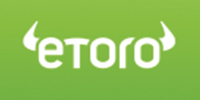
|
$200 | 1:30 | ASIC, CySEC, FCA, MiFID | VISIT BROKER 68% of retail CFD accounts lose money. eToro USA LLC does not offer CFDs, only real Crypto assets available. |
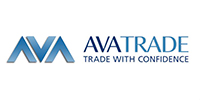 |
$100 | 1:400 | MiFID | VISIT BROKER |
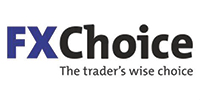 |
$50 | 1:200 | IFSC | VISIT BROKER |
Let’s check out some of the top-rated forex brokers for buying cryptocurrencies on the market.
Compare the Top Forex Brokers for Cryptocurrency Trading in 2022
Here’s a list of the best cryptocurrency brokers for trading cryptocurrencies online regardless of your Forex skill level.
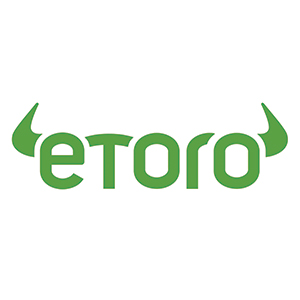 eToro
eToro
eToro is a major player in the CFD markets, and as a result give you the opportunity to trade CFDs that are based upon crypto. They are a multi-asset brokerage that not only provides a lot of financial markets, but it also features a lot of copy trading services, allowing traders to go back and forth and follow other traders who are more successful.
The company has offices around the world, originally being formed in Tel Aviv, Israel in 2007. They also have operations in Limassol, Cyprus and London, United Kingdom. They also have more recent offices in the United States, but it is by far the smallest arm of the company. The company features a proprietary web-based and mobile based platform that is relatively robust, but only for the most basic of functions. It should be noted that the company only allows crypto trading in the United States, as they do not pass the minimum liquidity issues to be licensed in that country.
Account Stats
Leverage: Leverage will depend on the asset being traded, with stock CFDs at 1:5, commodities starting at 1:10, ETF markets at 1:2, indices at roughly 1:5, and currencies.
Minimum deposits allowed: The minimum deposit for opening an account here is going to be $200, but just $50 if you are based in the United States or Australia. Unfortunately, the withdrawal fees are extraordinarily high, plus banking costs.
Regulations:
- CySEC (Cyprus)
- FCA (UK)
- ASIC (Australia)
Payment Options: Payment options at eToro include Visa, MasterCard, Diners Club International, PayPal, Skrill, Neteller, UnionPay, WebMoney, and Yandex.
US customers: Yes, but only allowed to trade crypto.
Pros and Cons of eToro:
Pros
- Allows crypto CFDs as well as stocks, FX, and commodities
- Ability to diversify in one account
- Ability to copy traders that are more experienced
- Regulated in several jurisdictions
Cons
- Limited offerings for Americans
- Basic platform
- Spreads are higher than most other brokers
Bottom Line
eToro is a broker that’s been around for quite some time, but quite frankly it’s biggest claim to fame is the ability to follow others. EToro was one of the biggest leaders upfront when it comes to social trading, something that has caught on and multiple other places.
However, following random people on the Internet is a bit of a dangerous proposition, so you need to take care when doing so. Furthermore, although it offers a whole list of various assets, the reality is that it is geared more for the beginning trader than anything else.
eToro is a multi-asset platform which offers both investing in stocks and cryptoassets, as well as trading CFDs.
Please note that CFDs are complex instruments and come with a high risk of losing money rapidly due to leverage. 68% of retail investor accounts lose money when trading CFDs with this provider. You should consider whether you understand how CFDs work, and whether you can afford to take the high risk of losing your money.
Past performance is not an indication of future results. Trading history presented is less than 5 complete years and may not suffice as basis for investment decision.
Copy trading is a portfolio management service, provided by eToro (Europe) Ltd., which is authorised and regulated by the Cyprus Securities and Exchange Commission.
Cryptoasset investing is unregulated in some EU countries and the UK. No consumer protection. Your capital is at risk.
eToro USA LLC does not offer CFDs and makes no representation and assumes no liability as to the accuracy or completeness of the content of this publication, which has been prepared by our partner utilizing publicly available non-entity specific information about eToro.
Past performance is not an indication of future results.
Cryptoassets are volatile instruments which can fluctuate widely in a very short timeframe and therefore are not appropriate for all investors. Other than via CFDs, trading cryptoassets is unregulated and therefore is not supervised by any EU regulatory framework.
eToro USA LLC does not offer CFDs and makes no representation and assumes no liability as to the accuracy or completeness of the content of this publication, which has been prepared by our partner utilizing publicly available non-entity specific information about eToro.
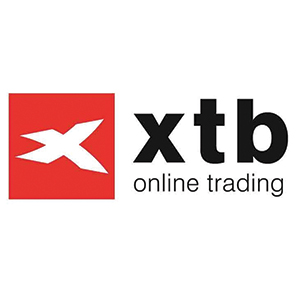 XTB
XTB
XTB is a “one-stop shop” for global assets, as there are over 3000 markets available. XTB stands for X-Trade Brokers, and is based Warsaw, Poland. They have offices globally and are highly regulated across the planet. They were originally opened all the way back in 2002, making them a rather well-established brokerage firm. They received multiple awards during 2019, continuing a long stream of prestige going back several years.
They offer Metatrader 4, both desktop and mobile versions. Beyond that, they also have xStation 5, a proprietary platform, as well as a mobile version of that as well. The Metatrader 4 platform is one of the most well-known around the world and has the benefit of millions of transactions being completed. The proprietary platform is robust as well and has all of the technical tools you need.
Account Stats
Leverage: Leverage will depend on the asset being traded but can be as high as 1:500 in the case of currencies.
Minimum deposits allowed: The minimum deposit for opening an account here is going to be $250.
Regulations:
- CySEC (Cyprus)
- FCA (UK)
- IFSC (Belize)
- KNF (Poland)
Payment Options: Payments are made by credit card, with no fees attached.
US customers: No, as they are CFD providers.
Pros and Cons of eToro:
Pros
- Allows crypto CFDs as well as stocks, FX, and commodities
- Global reach of markets
- Regulated in several jurisdictions
Cons
- No Americans
Bottom Line
XTB is a well-known brokerage that has been around since 2002. Ultimately, the markets that are offered boggle the mind, and open up a world of trading opportunities for those looking to take advantage of correlated and even non-correlated markets. The platform that the use is well-known, plus they also have a robust and professional in proprietary platform. Being regulated in multiple countries of course helps as well, giving traders the ability to feel a bit safer with their deposits. XTB is a strong option for traders.
 IG
IG
IG Markets is based on a London, England and is part of IG Group Holdings PLC. The corporation was formed back in 1974, when they began as IG Index, a way for traders to speculate on gold. Going online in 2003, they have since grown to have over 178,000 clients around the world. They have offices in 16 countries and are regulated heavily by the Financial Conduct Authority in the United Kingdom, as well as ASIC in Australia.
They are listed publicly and are the United Kingdom’s largest retail Forex broker. They offer spread betting, CFD trading, options, and currencies. They use ProRealTime, which facilitates automated trading and is one of the most complex charting platforms. They also use Metatrader 4, much like many other brokers around the world. There is also the IG Trading platform, a web-based basic platform. IG has even has recently opened up a US firm, although in the United States they only offer Forex as CFD markets are illegal. They offer over 16,000 markets.
Account Stats
Leverage: Leverage will depend on the asset being traded but can be extraordinarily high as options are priced differently than the average CFD.
Minimum deposits allowed: The minimum deposit for opening an account here is going to be $250, or equivalent in funding currency.
Regulations:
- FCA (UK)
- CFTC (US)
Payment Options: Payments are made by credit card, bank transfer, and PayPal.
US customers: Yes, but Forex only, through IG USA.
Pros and Cons of IG:
Pros
- Allows crypto CFDs as well as stocks, FX, and commodities
- Global reach of markets
- Regulated by a couple of the world’s strictest bodies
Cons
- Americans can only trade currencies. (US laws)
Bottom Line
You’d be pretty hard-pressed to find a broker that offers crypto that is older than IG. Obviously, they weren’t offering crypto currency back in 1974, but the structure of the company has been around for that long. With a huge number of offerings for traders to take advantage of globally, the broker is one that a lot of traders will be attracted to.
Beyond that, it is highly regulated and of course gives the average trader and ability to get involved with several markets at once. By trading crypto CFD markets through IG Markets, you have the ability to trade well beyond Bitcoin, Litecoin, or even Ripple, traders won’t be looking very far to get involved in other markets. IG is well respected and time-tested. IG markets makes a lot of sense for traders who have the ability to sign up.
 Swissquote
Swissquote
Swissquote opened in 1996, hailing from Gland, Switzerland. They offer a multitude of CFD markets, including cryptocurrency, Forex, commodities, indices, and bonds. Because of this, it gives you the ability to trade the world and as a result a lot of traders have found it as a place to call home. Heavily regulated, and publicly traded, they have an active interest in staying liquid and of course keeping a strong reputation.
Swissquote offers a proprietary platform called Advanced Trader, which is robust in and of itself, but also offers Metatrader 4 and 5, both of which are well-known obviously. This gives plenty of opportunities for traders to take advantage of indicators and expert advisors that are freely downloaded online. They also have a mobile version of those platforms for both Android and iOS.
Account Stats
Leverage: Leverage will depend on the asset being traded but can be as high as 1:100 in the case of currencies.
Minimum deposits allowed: The minimum deposit for opening an account here is going to be $1000, making it one of the more expensive deposits.
Regulations:
- FINMA (Switzerland)
- SFC (Hong Kong)
- DFSA (Dubai)
Payment Options: Payments are made by credit card and wire transfers.
US customers: No, as they are CFD providers.
Pros and Cons of Swissquote:
Pros
- Allows crypto CFDs as well as stocks, FX, and commodities
- Global reach of markets
- Regulated in several jurisdictions
- Strong platforms offered
Cons
- No Americans
- A bit more expensive minimums
Bottom Line
Swissquote has been around since 1996, making it a well-established firm. Operating in Switzerland also means that it is highly regulated and trusted by traders. They offer a strong choice of trading platforms, and also gives the trader and ability to trade various markets beyond crypto. That being said, with its higher than usual minimum deposit, traders may find it less attractive as there are highly regulated and trusted firms that will allow you to trade similar market offerings.
 ThinkMarkets
ThinkMarkets
ThinkMarkets was established in 2010 with headquarters in London and Melbourne. They also have hubs throughout Asia and the Pacific, as well as North Africa, Europe, South America, and the Middle East. They offer a range of markets including Forex, CFD offerings on equities, crypto, commodities, indices, futures, and more. They use the Metatrader 4 and 5 platforms, as well as ThinkTrader, which is a proprietary offering in mobile form. They had been growing rather quickly over the last decade, as traders tend to love the offerings available.
Account Stats
Leverage: Leverage will depend on the asset being traded, has Forex can be as high as 1:500.
Minimum deposits allowed: The minimum deposit for opening an account at ThinkMarkets is going to be $250.
Regulations:
- FCA (UK)
- ASIC (Australia)
- FSCA (South Africa)
Payment Options: Payments are made by credit card, Skrill, Neteller, BPAY, UnionPay, and wire transfers.
US customers: No, as they are CFD providers.
Pros and Cons of ThinkMarkets:
Pros
- Allows crypto CFDs as well as stocks, FX, and commodities
- Global reach of markets
- Regulated by a couple of the world’s strictest bodies
- Easily reached minimum deposit of $250
- Multiple payment and withdraw methods
Cons
- Americans can only trade currencies. (US laws)
Bottom Line
ThinkMarkets opened up a decade ago and has been growing rather rapidly. They offer plenty of opportunities to trade shares, crypto, bonds, precious metals, commodities, and quite a few other offerings. They also have multiple account types depending on what you need, and of course have the platforms that everybody loves. At this point, they are a strong candidate for your trading business, as the or trustworthy.
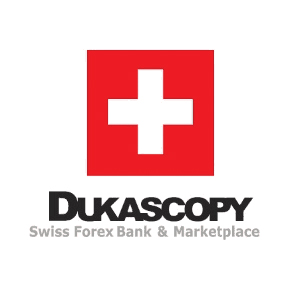 Dukascopy Bank
Dukascopy Bank
Dukascopy Bank opened in 2004, and is based in Geneva, Switzerland. It’s a full-fledged bank in Switzerland, offering primarily CFD trading, and its own ECN they have separate divisions in both Switzerland and Latvia. Not only do they allow CFD trading of crypto, they also offer crypto trading itself. Highly regulated through Swiss authorities, it features strong protections for clients as such. It also has its own Java-based desktop JForex platform, as well as Metatrader 4 and 5. This allows people to either use the platform that they have been offering for well over a decade, or the industry standard Metatrader versions. Both of these platform choices are extremely resilient.
Dukascopy has higher fees than usual, but they are known for professional research and analysis. They offer professional volume discounts as well, so depending on your situation you may find this a nice alternative, but for the smaller retail trader it tends to be a bit much.
Account Stats
Leverage: Leverage will depend on the asset being traded but can be as high as 1:100 in the case of currencies.
Minimum deposits allowed: The minimum deposit for opening an account here is going to be $1000, which is much less expensive than it used to be.
Regulations:
- FINMA (Switzerland)
- FCMC (Latvia)
Payment Options: Payments are made by credit card and wire transfers.
US customers: No, as they are CFD providers.
Pros and Cons of Dukascopy:
Pros
- Allows crypto CFDs as well as stocks, FX, and commodities
- Over 500 CFD markets
- Swiss bank
- JBuilder allows algo creation
Cons
- No Americans
- A bit more expensive minimums
- A bit more expensive commissions
Bottom Line
Dukascopy is a strong institutional grade broker. It offers the ability to not only trade crypto through the CFD market, but also deliverable crypto directly to your wallet. It has professional institutional grade research as well, and as a result it is quite often used by professional traders. Having said that, it is a bit of overkill for of the small retail trader, and therefore you may find better options unless you have a larger account and are trading decent size.
Having said that though, for years this broker has been considered top-tier, and one that a lot of traders aspired to get involved with.
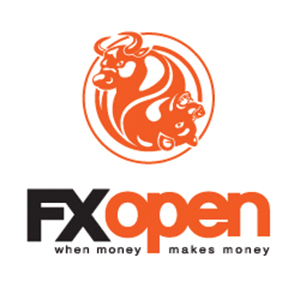 FXOpen
FXOpen
FXOpen was established in 2003, originally operating as an education center in Cairo, Egypt. They provided training in technical analysis of stocks and Forex at that time. In 2005 they open up their own brokerage and was quickly one of the largest in the world at that time. They offer Metatrader 4 and 5, and also allow PAMM accounts, giving traders the ability to handle multiple counts of the same time either for themselves or clients.
They offer multiple account sizes, and the ability to trade CFD markets across a whole host of financial assets. Forex and crypto are offered at FXOpen, and they have the ability to trade micro-positions, something that not all brokerages offer.
Account Stats
Leverage: Leverage of up to 1:500 is offered at FXOpen.
Minimum deposits allowed: The minimum deposit for opening an account at FXOpen is just $1 for Micro Accounts.
Regulations:
- NONE
Payment Options: Payments are made by wire transfers, credit cards, WebMoney, Neteller, Skrill, PerfectMoney, Yandex Money, FasaPay, and IntellectMoney.
US customers: No, as they are CFD providers.
Pros and Cons of FXOpen:
Pros
- Allows crypto CFDs as well as FX, and commodities
- Easily reached minimum deposit of $1
- Multiple payment and withdraw methods
Cons
- Registered in Nevis
- NOT REGULATED
Bottom Line
FXOpen has been around for some time, but at this point there is no reason whatsoever to trade with an unregulated broker. There are multiple brokers on this list that will more than likely suit your needs. Trading with an unregulated broker is unnecessary at this point in time and should never be done.
Common Forex Cryptocurrency Broker Questions
Here are some of the most common questions that people ask about using a forex broker to buy and sell cryptocurrencies in today’s market.
What is a cryptocurrency exchange?
A cryptocurrency exchange is simply a meeting point between buyers and sellers of crypto. There are no real physical exchanges like you would see in the stock market, as they are all electronic based. Having said that, there are multiple types of exchanges, and they are found worldwide. Simply put, you cannot trade cryptocurrency without a broker, unless of course you’re willing to physically meet people and exchange money for their crypto wallets or something to that effect.
What type of cryptocurrency exchanges are there?
There are multiple types of exchanges that you can use, but the two most common are either physical delivery, meaning that traders will sell their crypto to one another, with the ability to store that crypto in a wallet, or CFD markets which is what we have been talking about in this list. With the exception of Dukascopy, none of the trading venues on this list offer actual physical crypto. However, if you are looking for simplicity and to make money on price fluctuations, CFD markets are much easier as you don’t have to worry about hacking, whether or not it actually gets delivered, storing a wallet full of crypto, and the like. All you do is worry about getting the direction of the trade is correct.
What is the best cryptocurrency exchange for day traders?
Unfortunately, there is no simple answer to this question as it will depend on the assets that you are looking to trade. For example, if you are looking to trade Litecoin, the exchange needs to carry that asset. At this point, cost should also be examined. Ideally, you will be looking for a trading opportunity that is the cheapest, but also offers all of the assets that you are looking for. With that in mind, you will have to do your due diligence as to whether or not each one of these brokers will serve your purposes.
Beyond that, you also need to decide whether or not you are looking to hold actual crypto, or if you are simply trying to benefit from price fluctuations. It is very difficult to day trade actual crypto, because it does not move as much as it used to. In that sense, a CFD broker is probably going to be the best way going forward, but even at that point, spreads have widened out considerably over the last couple of years when it comes to see a brokers, and it’s not uncommon to see a spread of $50 come into play for Bitcoin. That is a substantial spread to overcome for day traders, and this explains why most crypto traders don’t day trade.
Which Bitcoin exchange has the lowest fees?
Fees will absolutely crush your returns. The overall average spread that we have found with these brokers is in the neighborhood of $50. XTB is even double that, so it certainly would be prohibitive for traders trying to make quick transactions. With that being the case, most of the brokers on this list will be more or less the same when it comes to fees, although some of them mark them in a different way. For example, eToro charges a 0.75% spread, which works out to about the same $50 at the time of writing. However, one would anticipate that eToro would change it spread if price went higher.
Who Would I recommend?
For the average retail trader, IG Markets will probably be one of the better choices. This is because you not only get the ability to trade crypto, but you also get the ability to spread out from there. For the beginning trader, eToro makes a bit of sense as you can in and of itself could be a very dangerous affair.
With that in mind, IG Markets makes the most sense as the spreads are essentially the same as many of the other market makers on this list, but also you can branch out from there if you choose to do so. At that point, it’s simply a matter of pressing a few buttons and trading Forex, or some other CFD that you have access to.
Beyond that, IG Markets have been around for ages and are highly regulated. The only broker on this list that is an absolute no would be FXOpen, as it has been around for far too long to not be regulated.
